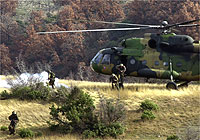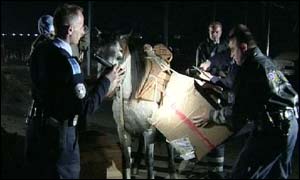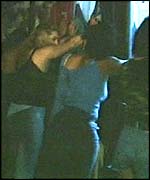|
Enter content here
A worker at the Varna Shipyard shows the salary, he's been waiting for 3 years. The first wave of 'lucky employees' were paid from 7 to 350 levs yesterday. Many workers walked round the cash desks to check if their names were on the pay-rolls. Photo BTA
President Georgi Purvanov invited to a working lunch the Ambassadors of the NATO member states. Attending were also Prime Minister Simeon Saxe-Coburg-Gotha, Defence Minister Nikolai Svinarov and Chief of General Staff Gen. Nikolai Kolev. BTA photo by Bistra Boshnakova
MACEDONIA - IMF NEGOTIATIONS.
MIA
Macedonia and the International Monetary Fund (IMF) completed Tuesday the first round of negotiations on new stand-by arrangement.
The arrangement is to be signed at the next IMF visit to Macedonia after January 20, 2003.
This round of negotiations focused on the economic and monetary policy. Macedonian Finance Minister Petar Gosev and Head of IMF Mission Franek Rozwadowski told the press conference that the budget's gap in 2002 was 3,5 - 4 billion denars.
Gosev noted that the budget's deficit was a result of unplanned expenditures of former Government, adding that there was huge disparity between the planed and realized public expenditures. According to Gosev, it was agreed to cover the deficit by increasing the savings in the ministries and the Government.
The Finance Ministry estimates the GDP growth in 2002 to be 0,5 percent, while IMF thinks it will be around 0. Gosev announced GDP growth of around three percent in 2003, while the inflation rate would not be higher than 3 percent.
IMF thinks that the overall budget expenses should not exceed Denar 8,5 billion. Gosev said that the budget income would be further reduced with the cancellation of the tax on financial transactions. So far, the income realized on the account of this tax has amounted to around Denar 6,3 billion.
"The Government will not increase the taxes and there will be less burden on the economy next year," Gosev said, adding that the Ministries of Defense, Interior as well as Labor and Social Policy should save most of their funds.
Rozwadowski said they have agreed on the macroeconomic policy for 2002 and 2003 and defined policy's objectives and measures for signing the arrangement.
According to him, the funds from the Donor's Conference were not lost and it was expected some of these funds to be obtained next year.
GOVERNMENT WILL NOT GRANT FINANCIAL SUPPORT TO COMPANIES.
MIA
The Macedonian Government has accepted the information about the developments in "Sasa" and "Zletovo" mines, and "Nova Makedonija" publishing house as well as about the privatization process of "Zletovo" smeltery.
According to Minister of Labor and Social Policy Jovan Manasievski apart from the salary paid to "Sasa" strikers, the Government will not grant any other financial support.
"There are no legal grounds for the government to grant financial support to the companies for settling the salaries' debts, and on the other hand the budget is empty," he said.
The budget's deficit is still not determined, but certainly it will be more than several billion denars, Manasievski added.
He urged the workers to cancel the strikes, because they would not resolve the problem.
"The main problem is that 'Zletovo' smeltery does not buyout the ore. Therefore, economically it is not logical to grant finances, because the enormous ore supplies would be just increased," Manasievski pointed out.
According to him, the Government cannot permanently support the loss making companies.
"We want to send a clear message to the other companies that the Government is not an institution in charge with allocating the money to the enterprises," Manasievski said.
The Government has been working on finding short and long-term solution for "Sasa" and "Zletovo" and the "Zletovo" smeltery, because both mines and the smeltery should work as one system.
"The short-term solution may be seek in selling of 9,000 tone of concentrate reserves that will provide sufficient funds for payment of due salaries," Manasievski said.
The long-term solution required detailed analysis on the situation in the mines and the smeltery, Manasiveski said.
"Indications say that the smeltery does not buy the concentrate from "Sasa" and Zletovo", purchasing it from Panama for a higher price, as one of the strategies to overtake the mines for lower price. In compliance with its authorities, the Government will make efforts to prevent such development of the situation," Manasievski said.
Referring to privatizing of the publishing house "Nova Makedonija", Manasievski said that the expert group in charge of the process' revision "has found many irregularities and violation of the selling agreement by both parties."
The revision was not aimed to make "Nova Makedonija" a state-owned house again, Manasievski said. "If the revising process leads to breaking of the agreement, the Government will open a new bid for the publishing house as soon as possible," he added.
He also sent a message to foreign investors, saying that the new Government guarantees fair conditions for buy-out of state-owned properties.
At today's session, the Macedonian Government decided to decrease retail prices of oil derivatives at an average of 2,97% starting from midnight, which is owed to the decrease of the average price of crude oil on the world market and the exchange rate of the denar in relation to the dollar.
In accordance with the Government decision, 86-octane fuel will cost Denar 50, 98-octane fuel - 51,5, while unleaded fuel - 48,5 per litre. Diesel fuels D-1 and D-2 will be sold at Denar 37, i.e. 36, extra light oil at 27 per litre, while crude oil will cost Denar 11,685 per litre.
The Government also discussed on reallocation of the Budget 2002 in the period between August 5- November 7. According to the information from the Finance Ministry, there were net decreases among the categories of expenses, i.e. increases of the Budget allocation in total amount of Denar 312,131,02. The more significant net decreases of Budget allocations were carried out in the Ministry of Interior, the Parliament, as well as children's social protection.
The Government conclusions oblige all budget users to make more detailed analyses of their own budgets, i.e. the planned and executed expenses. The Ministry of Finance is obliged to prepare a detailed information on the investment projects, which are financed by the means from the privatization of the Telecom, the status of the projects, especially viewed from the aspect of the physical realization and the necessary means for finishing of the projects that have already begun.
The Government session agenda also included the manner of use of the health blue cards in the enterprises, which are facing difficulties in their work, and belong to the group of loss making enterprises, state-owned enterprises, bankrupted enterprises, in which the state is a dominant trustee, as well as enterprises suggested by the Macedonian Trade Union Federation. These enterprises encompass 9,564 employees.
At today's session, Snezana Tasik was appointed Government Secretary General, along with appointments of members of steering boards of the Telecom, the Privatization Agency and the Fund for Pension and Invalid Insurance. Furthermore, the Government passed a decision, which will be submitted to the Macedonian Parliament, for dismissing of the Director of the Agency for Civil Servants.
TACTICAL MILITARY EXERCISE AT KRIVOLAK MILITARY BASE.
MIA

The military Academy "General Mihajlo Apostolski" organized on Tuesday tactical military exercise with helicopter landing at the Krivolak military base.
This exercise is part of the course for the Macedonian Army platoon commanders.
Sokol Mitrovski, deputy head of the Macedonian Army HQ, highly evaluated the tactical exercise and said that it proved the professionalism and knowledge of the ARM noncommissioned officers, who alone planned the exercise and were actively involved in its realization.
"This is one of the activities for training of the platoon commanders, developed according to the NATO standards for military education and training," he said.
Silvio Kolaric, commander of the course, said that the purpose of the exercise was to show the readiness of the noncommissioned officers to command with their platoons.
"In the past two months we obtained valuable knowledge and experience," noncommissioned officer Dimitar Kirkovski said, adding that they are now ready to comply with their future tasks.
Macedonia agrees to hand over war crimes cases to U.N. tribunal.
By KONSTANTIN TESTORIDES, Associated Press Writer
SKOPJE, Macedonia - Giving in to international pressure, Macedonian authorities agreed Tuesday to respect the authority of the U.N. war crimes tribunal in investigating atrocities committed during last year's ethnic conflict.
"We have decided to hand over the cases to The Hague tribunal," said Vlado Dzilvidziev, a spokesman for a Skopje court which had begun investigations into atrocities allegedly committed during a six-month conflict between ethnic Albanian insurgents and government forces.
Dzilvidziev said local investigations into the cases had been halted and that arrest warrants for 35 suspects believed to be all ethnic Albanians would soon be nullified.
The insurgency took dozens of lives on both sides, but authorities had so far focused mainly on bringing ethnic Albanians to justice.
Last week, a delegation of European Union, NATO and other Western officials urged the government to respect the peace accord that ended last year's fighting and allow the U.N. court to try possible cases of war crimes.
The peace accord included an amnesty for most of the ethnic Albanian rebels, but said any war crimes must be prosecuted by the international court.
Last week's warning was coupled with a threat that the government could face serious consequences if it disregards the U.N. court, which was founded to deal with atrocities committed in the Balkan wars. Yugoslavia's former president, Slobodan Milosevic, is on trial at the court for alleged war crimes and genocide.
Macedonia gained its independence from Yugoslavia in 1991 and until last year had avoided the ethnic conflicts that ravaged the region in the 1990s.
Revoking the arrest warrants is likely to defuse tensions. Some of the 35 suspects have since became politicians including former rebel leader Ali Ahmeti, who currently heads the most popular ethnic Albanian political party.
The peace deal, signed August 2001 under Western auspices, granted broader rights to the sizable ethnic Albanian community nearly a third of Macedonia's 2 million people.
Hundreds of Macedonian miners are on hunger strike in their pits.
By KONSTANTIN TESTORIDES, Associated Press Writer
SKOPJE, Macedonia - Nearly 500 lead and zinc miners in eastern Macedonia were on a hunger strike Tuesday to demand unpaid wages.
The miners of the SASA mine in Makedonska Kamenica, about 100 kilometers (60 miles) east of Skopje, say the government owes them three months' wages which average about US$300 a month. The strike began last week.
"We demand our wages and we will stay here as long as it takes," said 42-year-old miner Stoil Atanasovski, visibly exhausted and pale on the eighth day of a hunger strike carried out in the damp, dark pit some 2,400 meters (7,200 feet) underground.
The government, faced with deep economic problems, recently announced plans to privatize the mine, and said it can only afford to pay each worker wages for one month.
"Our budget is empty and we cannot provide more than one salary to the miners," government spokesman Saso Colakovski said.
The striking miners claim the government intends to degrade the value of the mine so their allies can purchase it for a small sum.
On Tuesday, government representatives visited the mine at the foot of Mt. Ruen in eastern Macedonia, expressing hope that an agreement might be reached on Wednesday.
But hunger strike leader Saso Nikolov said the miners are determined to continue until their demands are met.
"We are fighting for the future of the mine and the fate of some 10,000 people who live in Makedonska Kamenica," Nikolov said Tuesday.
Vojo Stamenkovski, 43, who said he has worked at the mine since 1981, said: "It is so humiliating that we have to beg for what belongs to us."
Macedonia, a small country of 2 million which has been recovering from a bitter conflict last year between ethnic Albanian rebels and Macedonian government troops, faces serious economic problems, including rampant unemployment and plunging living standards.
In the biggest challenge to the new pro-democracy government, which was formed only a month ago, about 8,000 workers including textile, printing and trade companies are currently on strike throughout the country. They are demanding higher wages and protesting government plans to privatize several state-run firms.
November 26 in History.
Standartnews
In 1878 the first Military School for commanding cadres was opened in Sofia.
In 1913 Exarch Joseph arrived in Sofia from Istanbul.
BULGARIA - CHIEF MUFTI - DONATIONS.
BTA
Razgrad, Northeastern Bulgaria, November 26 (BTA) - The donations for the Muslim denomination coming to Bulgaria from sources abroad will be directly controlled by the State, Chief Mufti Selim Mehmed said in Razgrad late Monday evening during a religious supper on the occasion of the commencement of the Holy Month of Ramadan.
Cash donations will be placed on an account in the name of the Finance Ministry. They will be available to the Chief Mufti's Office only after their origin is established. "This will block the access to Bulgaria of money of dubious donors, proponents of fundamentalism," Mehmed said.
After a meeting of the Chief Mufti with Finance Minister Milen Velchev, it emerged that the Chief Mufti's Office will be subject to running audit. The accounts of the regional mufti's offices will also be controlled by the national financial authorities.
The Chief Mufti's Office will also take other security precatutions against the infiltration of Islamic fundamentalists in Bulgaria. Files will be opened on all Islamic clergymen working in Bulgaria, in which the Chief Mufti's Office will enter records on their education, career and training stints abroad. The preachers will be closely watched for contacts with fundamentalists from the Arab states, the Mufti specified.
EU - BULGARIA - PARLIAMENTS.
BTA
National Assembly Chair Gerdjikov Attends Meeting of European Parliament President, Parliamentary Chairs of EU Applicants.
Brussels, November 26 (BTA) - Bulgarian National Assembly Chairman Ognyan Gerdjikov Tuesday attended the meeting of European Parliament President Patrick Cox with the parliamentary chairs of the EU applicant countries, the press office of the Bulgarian Parliament said.
The participants in the meeting discussed the practical base of the work of the EU applicant countries observers in the European Parliament and the preparation of the meeting of the European Council in Copenhagen. Attending the talks were also European Parliament Vice President Guido Podesta, EU Enlargement Commissioner Guenter Verheugen and chairman of the Foreign Policy Committee of the European Parliament Elmar Brock.
In his address to the participants in the meeting, Gerdjikov expressed Bulgaria's expectations that his country will be given an updated roadmap with a concrete membership date and strengthened pre-accession strategy at the meeting in Copenhagen.
"The important thing is there to be no new conditions in the roadmap, so that in the final stage of the negotiations Bulgaria be treated on an equal footing as the 10 new members," Gerdjikov said. He said his country relies on clear principles and parameters of the financial aspects of the pre-accession process and on observing the principle of assessing each candidate according to their own performance and achievements.
"In the process of the negotiations Bulgaria proved it can take difficult decisions and treat seriously its commitments. An example for this is the decision on the Kolzoduy nuclear power plant," Gerdjikov said.
The Bulgarian officials expressed Bulgaria's satisfaction with receiving an invitation to start accession talks for NATO during NATO's summit in Prague. "This is a clear proof that we share one and the same values, belong to one and the same community of ideas and principles and have one and the same goal: unified, secure and prospering Europe," Gerdjikov said.
PRESIDENT - 2003 DRAFT BUDGET - DISCUSSION.
BTA
Financial Experts, MPs, Tradeunionists, Bankers Assess Parameters of 2003 Draft Budget at Discussion Hosted by President Purvanov.
Sofia, November 26 (BTA) - At a discussion hosted by President Georgi Purvanov on Tuesday, central bank Governor Svetoslav Gavriiski, Deputy Finance Minister Kiril Ananiev, MPs, independent financial experts, bankers, representatives of the Confederation of Independent Trade Unions and of the Podkrepa Confederation of Labour, of the National Association of Municipalities and of business organizations tried to formulate assessments of the parameters of the 2003 draft budget.
Will macroeconomic stability be preserved? Are the budget projections realistic or do they pose a risk? How will macroeconomic problems be addressed with this draft budget? Is this budget social? What is the assessment of municipalities' stability? Does financial decentralization stand a chance? These are part of the questions that President Purvanov posed to the participants in the discussion.
He acknowledged the "positive fact" that the draft budget was presented more or less in time and that it provides a projection for the period ending 2005 as a base for a longer-term analysis, but noted that the budget was formulated and some moot points were handled with a "disturbing refusal to engage in dialogue."
The verbatim record of the discussion and a summary of the suggestions and opinions set forth will be made available to the Government and the National Assembly before the budget bill comes up for a second reading, said the President's Press Secretary Boika Bashlieva.
Various suggestions were made at the meeting: that the President veto the bill, that he take a stand between the two readings, or that he do not object to the substance of the law because it basically reflects the Government's policy, Bashlieva said.
Former finance minister Dimiter Kostov praised the effort to achieve a balanced budget. He does not like the "certain dose of optimism about the revenue projections" and "the insufficient backing of expenditures by tangible action for restructuring of individual sectors." As he put it, these two problems are the root cause of all controversies, discontents and criticisms of the budget.
Another ex-finance minister, Stoyan Alexandrov, said that if violations of the law are detected in the preparation of the budget, the President could veto it, but he must not pronounce on the substantial aspects of the budget, which is within the ambit of the Government and for which it assumes the respective responsibility. Alexandrov does not think a veto is warranted.
As he put it, the Government "does not have much room for manoeuvre." "If the existing practice of financial discipline and compliance continues, there are untapped reserves in the budget for improvement of revenue compliance and of the performance of the controlling authorities," Alexandrov said.
In his opinion, if Bulgaria produces compelling arguments in favour of its views on revenues, these arguments can be presented to the IMF Executive Board or a new visit of the mission can be arranged. In his opinion, however, it is absurd to accept the Fund's suggestions and cut revenue projections by 300 million at this stage. "To do this, the budget should be withdrawn from Parliament and thoroughly revised," he added.
National Association of Municipalities Executive Director Ginka Chavdarova said that more than half of the participants discussed the problems of municipalities in their statements. She added that the President expressed the hope that there will be changes for the better between the two readings of the draft budget in Parliament.
"The relevance of such a large allocation for the social programme was called into question," Chavdarova noted.
Georgi Pirinski MP of Coalition For Bulgaria said the Government has not given the public the appropriate reasoning and information on the budget. The municipalities' financial decentralization and the judiciary budget also figured high on the agenda of the discussion. "I expect the Finance Minister to abandon his adamant position and show the appropriate openness to dialogue," Pirinski said.
Podkrepa Confederation of Labour leader Konstantin Trenchev acknowledged the "proper way in which the presidential institution is treating civil society by consulting it" and noted the lack of such discussions during the preparation of the budget. Confederation of Independent Trade Unions leader Zhelyazko Hristov described the budget as a "back-out budget."
SLOVAKIA-PRESIDENT-VISIT.
BTA
Slovak President Schuster Arrives on Working Visit.
Sofia, November 26 (BTA) - Slovak President Rudolf Schuster arrives November 27 on a one-day working visit, the presidential press secretariat said Tuesday.
He will have a one-to-one session with Bulgarian counterpart Georgi Purvanov and will confer with Prime Minister Simeon Saxe-Coburg-Gotha. The Bulgarian head of state will give a lunch in honour of the guest.
At a ceremony at Sofia's St. Kliment Ohridski University, President Schuster will be awarded an honorary doctor's degree.
He will open an exhibition of Jan Kudlicka and Rastislav Biarinec at the Gallery of International Art and will be at the press launch of the Bulgarian translation of his book "The Ultimatum". Among the speakers at the event in Sofia's Sheraton are writer Anton Donchev, history professor Andrei Pantev, President Purvanov and President Schuster himself. The author will get as a present from the Bulgarian President the first Bulgarian copy of his book.
BULGARIA - ORGANIZED CRIME - INTERNATIONAL CONFERENCE.
BTA
Sofia, November 26 (BTA) - The countries of Southeastern Europe will be assisted with technical facilities in crime control. Such assistance was discussed at the International Conference on Organized Crime in South Eastern Europe, which ended in London.
Back from Britain on Tuesday, Bulgarian Interior Minister Georgi Petkanov said that Justice, Interior, and Foreign Ministers from some 60 Balkan, neighbouring, EU and other countries and senior officials from multilateral organizations, including the European Commission, took part in the EU-led conference, co-hosted by the British Home and Foreign Secretaries. The participants adopted a declaration concurring on the need to step up prevention, crack on international crime rings and take inevitable penal action against persons committing offences of this type, including confiscation of their property, Petkanov said.
The participants in the conference found that organized crime finds scope and develops where corruption thrives. Crime in Southeastern Europe affects adversely countries Europewide, which prompted the conference to review the status and map out guidelines and measures for crime control, the Interior Minister said. He delivered a report on the fight against organized crime in Bulgaria.
The conference recommended that the European standards be adopted in organized crime control in the countries of the region, that specialized services and units be set up, that regional and pan-European cooperation be promoted, and that each country report back on its progress periodically. Successor states of the former Yugoslavia were identified as sources of organized crime in reports delivered at the conference.
Conferring with Petkanov, EUROPOL Director Juergen Storbeck said he will arrive in Sofia next March to sign a cooperation agreement with Bulgaria. The Bulgarian delegation to the conference included Deputy Interior Minister Boiko Kotsev and the Director of the National Service for Combating Organized Crime Roumen Milanov. They met with the Interior Ministers of Greece and Albania and with a British Parliamentary Under-Secretary of State at the Home Office.
Ministers Win in Who Wants To Be a Millionaire.
Standartnews
The economy team is raising $12,000 for a scholarship. Gati al-Jeburi won 5,000 levs; the president and PM are also to be invited to the show.
The economic team in the Cabinet dared to take part in the show Who Wants To Be a Millionaire. Deputy PM Nikolay Vassilev, Finance Minister Milen Velchev and Deputy Finance Minister Gati al-Jeburi participated in the show for charity purposes. They had to win over $12 000 for a scholarship in business administration MA program which should be granted to an official at the state administration or an employee at an NGO. Gati al-Jeburi was the best. He won 5,000 levs. Finance Minister Milen Velchev won only 3,000 levs. The performance of Deputy PM Vassilev was the poorest one.
Shipyard Employees Took 7 Levs Each.
Standartnews
of the wage arrears, they've been waiting from the Varna-based company for almost 3 years. Each of the workers will receive only 7.2 percent of the remunerations. The biggest amount to be paid will worth 350 levs. Income taxes and health insurances will be levied upon the amounts that exceed 110 levs.
NMS MPs Rebel Against The Yuppies.
Standartnews
Vassil Petev
Dimitar Lambovski required 3 new ministries to be established.
NMS MPs headed by Dimitar Lambovski, rebelled against the yuppies in the cabinet. They said that the Economy Ministry was not working efficiently and needed urgent reforms. The Ministry, headed by Nikolay Vassilev to be divided into four other ministries, MPs Dimitar Lambovski, Krastyu Mehandov and Petya Bozhikova insisted yesterday. They promoted a project for urgent changes in the management of the economy. The changes envisage a Ministry of Tourism, Ministry of Trade and Ministry of Small and Medium Business to be set up. It is only the state-owned companies that should be run by the Economy Ministry.
We Will Make Everybody Pay His Taxes.
INTERVIEW Standartnews: Gati al-Jeburi

Stephan Kioutchukov
We demand that Administration officials be polite, says deputy-Minister of Finance Gati al-Jeburi.
- Mr Jebury, IMF has some doubts, that the revenues in Budget '2003 will be collected. What measures is the Ministry of Finance going to take in order to ensure the collecting of the revenues?
- The measures were enlisted in the Program for increasing collectibility, adopted by the Council of Ministers - more efficient inspections not only for this or that tax but for every single one. Everyone involved in the Bulgarian economy will pay tax on his part to the society.
- A campaign is under way for testimonial of the tax officers. On what basis will their work be estimated?
- Professional skills, work efficiency as well as their politeness to the physical persons when they deal with them.
Kosovo police battle smugglers.
By Rory Maclean
BBC News correpsondent in Kosovo

Smugglers' ponies are trained for rough terrain.
High in the mountains of northern Kosovo, Peter has a special task.
The ex-German paratrooper is a police officer serving with the UN, whose role is to check patrol routes for mines and unexploded cluster bombs that litter this area of the border with Montenegro.
They hunt the smugglers who bring horse trains over deeply rutted tracks that snake through the mountainous country.
The ponies and mules are specially trained for the rough terrain and their horseshoes are bent down at the back to create studs that help the animals grip under their heavy loads of cigarettes alcohol and drugs.

Women are also trafficked.
"Maybe every second night the drugs come, by horse, maybe five or 50 horses, a maximum of 100," says Peter. The drugs, including heroin from Turkey, are en route to northern Europe, while cigarettes and alcohol go south.
But the hunters know they are also the hunted. The armed smugglers who inhabit the villages at the base of the mountains keep constant watch. They use sophisticated radio communications, to try to keep ahead of the police. If that fails there are more traditional methods in an area where the blood feud is a way of life.
Crime playground.
Peter and his men have just had a warning. Two Kosovo Police Service Officers had their cars burned outside their homes. They know its just a beginning because this is not about a little local cottage industry.
The smugglers work hard for bigger interests, the organised crime gangs that traffic drugs, women and weapons across Europe; whatever commodity commands a high profit. Because of a combination of geography, history and culture, organised crime has a pernicious grip on this an area of the central Balkans.
One senior officer described Kosovo as a "playground" for organised crime. Kosovo is a natural crossroads with largely porous borders. The structure of organised crime gangs often follows that of army units with commanders lieutenants and soldiers.

Turkish heroin is carried through Kosovo to Western Europe.
Impenetrable gangs.
In an area where the tensions mainly between ethnic Albanians and Serbs have led to the creation of parallel networks for business, the conditions are ripe for exploitation. Unemployment is a further factor. On some scales its running at 50%.
On top of that the gangs are almost impossible to penetrate because the members are almost always either related or from the same village. However a large warehouse in northern Kosovo gives the lie to the idea that this is an area where the ethnic tensions are insurmountable.
The warehouse contains 20 million fake Marlborough cigarettes seized by UN customs officers. They were the product of close co-operation between ethnic Albanian gangs and Serbian organised criminals.
As John Robertson in charge of intelligence and investigation for Customs in Kosovo put it: "There are no ethnic problems with organised crime. It seems the barriers one encounters in other fields are not present when it comes to exploiting financial opportunity."
|



